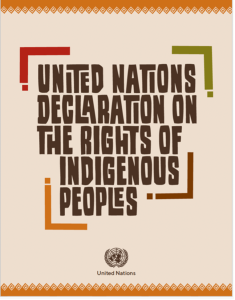Module 4: Related Practice Issues: Trauma-Informed Care, Supporting Strength – based and Resiliency Approaches, Primordial Prevention
Section 1 (continued)
These policy related gaps speak to the recognition that Indigenous peoples around the globe have identified policy system barriers and call for reform in important national and international reports including the Truth and Reconcilliation Committee the ‘Missing and Murdered Indigenous Women and Girls’s Final Report and the United Nations Declaration on the Rights of Indigenous Peoples (UNDRIP).
An example of a policy reform enabler for the development of more culturally relevant Indigenous healthcare is that of what’s known as ‘Jordan’s Principle’; a child-first principle named after a young Cree boy from Norway House First Nations in Manitoba. Jordan had complex medical needs and spent two years in hospital due to a jurisdictional dispute between the federal and provincial governments about who should pay for his care when he was discharged. The principle is supposed to ensure that First Nations children can access all public services as needed. However, in 2016, the Canadian Human Rights Tribunal (CHRT) identified the Canadian Government’s approach to services for First Nations children as discriminatory. In response, the government has engaged in a renewal effort to ensure an equitable, culturally appropriate service approach will be provided (Government of Canada; Indigenous Services, 2020).
More recently, Indigenous groups and the family of Joyce Eshaquan called for the development and uptake of a policy similar to Jordan’s principle. Joyce Eshaquan was a First Nations mother who died in 2016 at the Joliette Hospital Center in Lanaudiére, Quebec. She endured racist and discriminatory behaviour by hospital staff which generated a national outpouring of outrage and calls for healthcare reform. The development of ‘Joyce’s Principle’ was also inspired by the United Nations Declaration on the Rights of Indigenous Peoples (UNDRIP) (United Nations, 2007).
 UNDRIP is an international instrument adopted on September 13, 2007 by the United Nations. It sets out a universal framework of minimum standards for ‘the survival, dignity and well-being of Indigenous peoples of the world and it elaborates on existing human rights standards and fundamental freedom as they apply to Indigenous peoples’ (United Nations, 2007).
UNDRIP is an international instrument adopted on September 13, 2007 by the United Nations. It sets out a universal framework of minimum standards for ‘the survival, dignity and well-being of Indigenous peoples of the world and it elaborates on existing human rights standards and fundamental freedom as they apply to Indigenous peoples’ (United Nations, 2007).
The conclusions of a Joyce’s Principle brief calls for governments to ‘take a strong stance against systemic racism lived by Indigenous people in healthcare and social services.’ Supporters also call for individuals to make a personal commitment to advocating for the adoption of the Principle by political and institutional bodies along with the six pillars of the principle (Joyce’s Principle Office, n.d.).
More information about Joyce’s principle.
For more information about how UNDRIP can be applied as a policy influencing tool: see this YouTube video clip:
Finally, much work has been done in Canada to increase awareness regarding the Social Determinants of Health (SDOH) and the need to consider culturally relevant determinants in the realm of health policy, research and healthcare services. Indigenous women’s perspectives on SDOH and how they impact CVD/s need to be considered by the cardiology community.
For example, many Indigenous women, while understanding the importance of a healthy diet, also experience economic barriers and often, the only option is highly processed and sugary foods. Sedentary lifestyles have often replaced traditional active lifestyles with resulting negative impacts on heart health. Other factors related to colonialism may be at play. For example, some women in a recent study resented people telling them what to do and found the introduction of heart-healthy lifestyle activities to be intrusive and reminding them of generational colonizer behavior (Gomes et al., 2023).
Government of Canada; Indigenous Services. (2020, October 5). Jordan’s Principle [Resource list]. https://www.sac-isc.gc.ca/eng/1568396042341/1568396159824
United Nations. (2007). United Nations Declaration on the Rights of Indigenous Peoples | United Nations For Indigenous Peoples. https://www.un.org/development/desa/indigenouspeoples/declaration-on-%20the-rights-of-indigenous-peoples.html
Joyce’s Principle Office. (n.d.). Joyce’s Principle. Retrieved July 31, 2024, from https://principedejoyce.com/en/index
Gomes, Z., Hart, D., & Downey, B. (2023). Indigenous Women’s Perspectives on Heart Health and Well-being: A Scoping Review. CJC Open, 5(1), 43–53. https://doi.org/10.1016/j.cjco.2022.10.007
